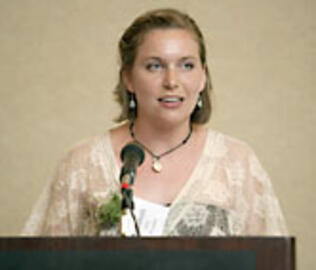
Creative Writing Award Winner - 2009
Class of 2011
Elizabeth Holt ‘11 graduated from Willamette University with a Bachelor of Arts degree in International Health and Spanish, cum laude. A member of Phi Beta Kappa, she has a long standing concern and passion for survivors of domestic violence and sexual abuse. A former construction contractor, waitress, and theater producer, Elizabeth is in her first year at YSN, studying to become a Women’s Health Nurse Practitioner.
Listen to Elizabeth Holt’s Life Support for the Survivors as a netcast on Yale’s iTunesU
Transcript of the Reading:
Life Support for the Survivors
Death pacts between nurses are made regarding your situation. We pseudo-joke, “Pull the plug if I ever end up like that.” The consensus is that we would rather die than be who you are: completely dependent on equipment to breath, eat, drink and defecate. We talk about your husband amongst ourselves in the nurses’ station, calling him ridiculous because he is waiting for a miracle and leeching the hospital’s resources.
While the nurses question the value of your continued existence, your husband stares adoringly at fragments of your face that he can see beneath the tubing and breathing apparatus. My nursing orders for the day involve less time caring for you and more time caring for the machines that sustain you. While I drain and adjust, insert and flush, your husband’s eyes behold you and glisten. His miracle is that you wake up and laugh about what a fuss we made over you. He tells me you have a beautiful laugh—like a bird warbling in the forest.
Under the ventilator your lips maintain a sleepy smile. At your side, your adoring husband showers you with a love from fairytales—the prince looks at sleeping beauty and basks in the warmth and serenity of a pheromone haze before he thinks to kiss her. I am wrapped in your lover’s high and for a brief moment I believe that if he kissed you, you would open your eyes, give him the warbling laugh he is desperate to hear and say, “what took you so long to figure how our story is supposed to end?”
A chemical reverie saturates your room with the potent drug that God saved for lovers. Once I exit your room and the drug’s buzz wears off I know how your story will end. Your husband knows it, too. But for now he is euphoric in the last moments of your presence that he will ever feel again. I pause at the door on the way out, finding it difficult to leave a connection that feels so complete.
I wonder what those machines are for, if not to support you until your husband is capable of living without you. New technology adds an additional step in the mourning ritual to the end of life. In another era, your husband would already be mourning your death. Now, he has the opportunity choose when he is ready to face the inevitable searing of your life from his and to prepare for his transition to an existence without you.
Back at the nurses’ station, your situation is still the topic of conversation. I join as we are discussing the least painful way to die. It is unfortunate that we do not discuss the least painful way to survive because that is the prospect your husband is facing.
